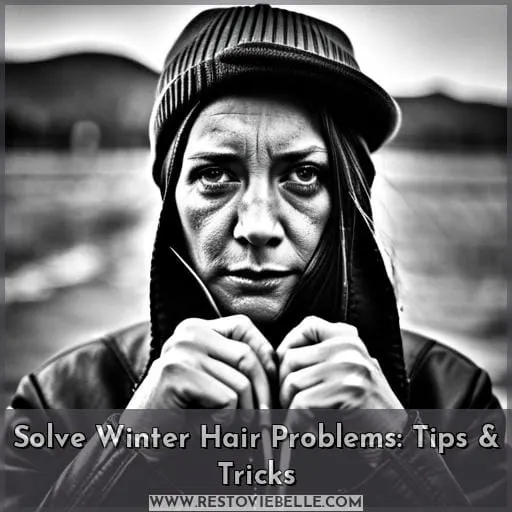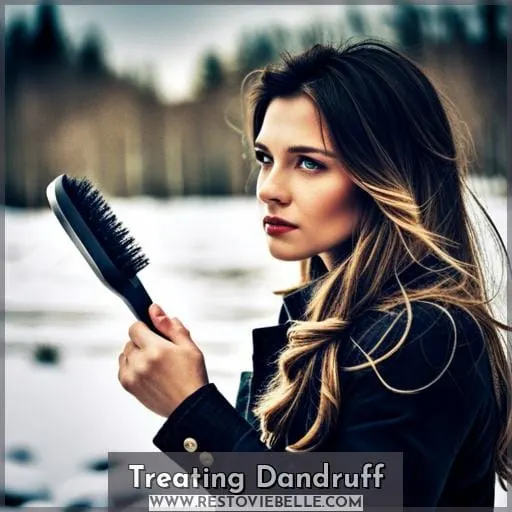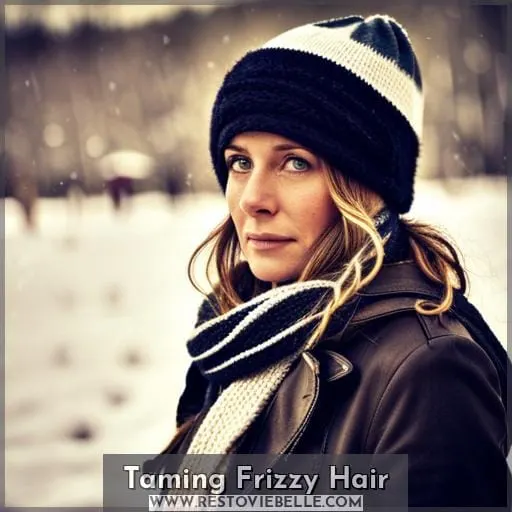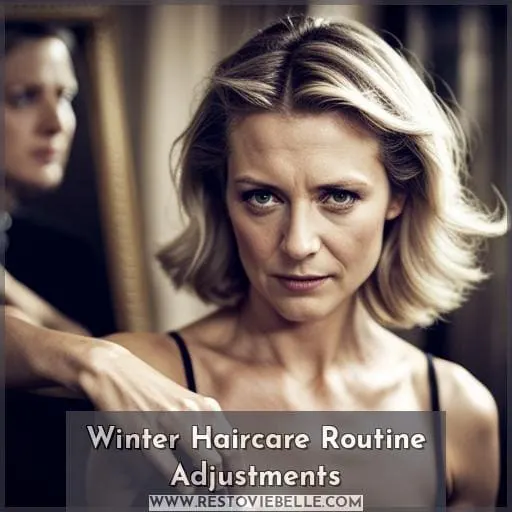This site is supported by our readers. We may earn a commission, at no cost to you, if you purchase through links.

Say goodbye to dry scalp, frizzy locks, and pesky dandruff with our expert tips and tricks for solving all your winter hair problems.
From hydrating products to adjusting your hairstyling routine, we’ll help you keep those tresses healthy and fabulous all season long.
Get ready to conquer the cold weather with confidence and gorgeous hair!
Table Of Contents
- Key Takeaways
- Understanding Winter Hair Problems
- Dealing With Hair Static
- Managing Dry and Tight Scalp
- Treating Dandruff
- Preventing Split Ends
- Taming Frizzy Hair
- Winter Haircare Routine Adjustments
- Frequently Asked Questions (FAQs)
- How can I prevent my hair from getting static in the winter?
- What are some natural remedies for a dry and tight scalp during winter?
- Are there any specific products or treatments for managing dandruff in the winter?
- How often should I trim my hair to prevent split ends during the winter months?
- What are some effective ways to tame frizzy hair in cold and humid winter weather?
- Conclusion
Key Takeaways
- Use moisturizing hair products and deep conditioning masks to combat dryness and frizz caused by cold winter weather.
- Protect your hair from the harsh elements by wearing hats or scarves and avoiding excessive heat styling.
- Switch to a creamier and hydrating shampoo to prevent a dry and tight scalp during winter.
- Regularly wash your hair and maintain good hygiene to prevent dandruff buildup during the winter months.
Understanding Winter Hair Problems
Winter can wreak havoc on your hair, causing a range of problems such as:
- Static
- Dry and tight scalp
- Dandruff
- Split ends
- Frizzy hair
Understanding these winter hair problems is essential in finding effective solutions to keep your locks healthy and manageable during the colder months. By addressing each issue individually with targeted tips and tricks tailored to your specific needs, you can overcome these challenges and maintain beautiful winter-ready tresses.
Hair Static
If you’re struggling with hair static during the winter months, there are a few simple tips and tricks that can help you combat this common problem.
One key tip is to keep your hair hydrated by using moisturizing products. These products will add moisture to your strands, making them less prone to static and frizz.
Additionally, it’s important to avoid excessive use of heating tools as they can dry out your hair further.
Using a humidifier in your home can also help add moisture back into the air, reducing static in your hair.
Dry and Tight Scalp
To address dry and tight scalp during winter, switch to a creamier and more hydrating shampoo.
Winter can cause the scalp to become dry, leading to itchiness and tightness.
Limit hot showers as they can further dry out the scalp.
Use a scalp massager to improve blood circulation and apply natural oils like coconut or olive oil for deep conditioning.
Regular trims will also help maintain healthy hair during this season of winter hair problems.
Dandruff
Combat dandruff during winter by regularly using an anti-dandruff shampoo and conditioner.
Dandruff, characterized by a dry and flaky scalp, can be caused by the lack of humidity in winter.
To treat dandruff effectively, incorporate zinc pyrithione into your haircare routine as it helps control the excessive growth of yeast on the scalp.
Keep your scalp healthy and moisturized with proper hydration and nourishing products to prevent dandruff from becoming a bothersome issue during colder months.
Split Ends
- Regularly trimming your hair
- Using moisturizing hair care products
- Dryness is a major cause of split ends, so it’s important to keep your hair hydrated.
- Use leave-in conditioners
- Avoid excessive heat when styling your hair
- Protecting your locks from harsh winter elements with hats and scarves
Incorporate these tips into your haircare routine for healthier, stronger strands that are less prone to breakage.
Frizzy Hair
- Taming frizzy hair in the winter is essential to maintain a sleek and polished look despite the cold and humid weather.
To combat frizz, use deep conditioning masks to hydrate your hair.
Consider using a silk or satin pillowcase to reduce friction while you sleep.
Use a wide-tooth comb for detangling without causing breakage, and protect your hair from the elements with a quality leave-in conditioner for moisturized locks throughout winter styling.
Dealing With Hair Static
To combat hair static during the winter, it’s important to keep your hair hydrated.
Dry hair is more prone to static, so using moisturizing hair products can help prevent this issue.
Additionally, avoid overusing heating tools that can dry out your hair further and consider using a humidifier in your home to add moisture back into the air and reduce static.
Hydrated Hair
To combat hair static during the winter, keep your hair hydrated and less prone to static by using moisturizing products.
- Opt for hydrating shampoos that replenish moisture and prevent dryness.
- Deep conditioning treatments can also provide intense hydration to combat static.
- Additionally, using a leave-in conditioner can help lock in moisture throughout the day, reducing frizz and flyaways caused by dry air.
Hydrated hair is more resistant to static electricity, ensuring smoother and more manageable locks all winter long.
Moisturizing Hair Products
Combat hair static during the winter months by incorporating moisturizing hair products into your routine.
Hydrating your hair is essential to prevent static and maintain scalp health. Look for products that provide deep moisture, such as coconut oil or a nourishing hair mask.
Incorporate these products into your regular haircare regimen to keep your locks hydrated and frizz-free.
Essential oils can also be beneficial for maintaining overall hair health and preventing issues like dandruff and split ends.
Avoiding Overuse of Heating Tools
To prevent hair static during winter, avoid excessive use of heating tools that can dry out your hair.
Heat styling tips include using alternative methods like air-drying or heat-free styling techniques to minimize damage.
Protecting your hair from cold air is crucial in preventing issues such as split ends, itchy scalp, and hair breakage in winter.
By avoiding overuse of heating tools and opting for gentler alternatives, you can maintain healthier and more manageable hair throughout the season.
Using a Humidifier
If you’re looking for an effective solution to combat hair static during the winter months, consider using a humidifier in your home. Humidifiers provide several benefits that can help prevent static and keep your hair hydrated.
Here’s how a humidifier can help:
- Increases moisture in the air, reducing dryness that leads to static.
- Prevents hair from becoming charged with electricity.
- Creates a more comfortable environment during the winter season.
Using a humidifier is an easy and convenient way to maintain healthy and manageable hair throughout winter.
Managing Dry and Tight Scalp
To manage dry and tight scalp during the winter, there are a few key strategies you can try:
First, switch to a creamier and hydrating shampoo to provide moisture to your scalp.
Additionally, it’s important to limit hot showers as they can further dry out the scalp.
You may also consider using a scalp massager to improve blood circulation and apply natural oils like coconut or olive oil for deep conditioning.
Creamier and Hydrating Shampoo
You can address dry and tight scalp during winter by using a creamier and hydrating shampoo. These shampoos are specifically formulated to provide extra moisture to your scalp, helping to alleviate dryness and tightness.
They work by replenishing the natural oils on your scalp that may be stripped away due to harsh weather conditions or hot showers. Additionally, incorporating a regular scalp massage with a massager can improve blood circulation, promoting healthier hair growth.
Table: Benefits of Creamier and Hydrating Shampoo
| Benefits | Explanation |
|---|---|
| Provides Extra Moisture | Helps combat dryness in the scalp |
| Replenishes Natural Oils | Restores the essential oils that may have been stripped away |
- Improves Scalp Health – Promotes healthy hair growth
- Alleviates Dryness – Relieves discomfort caused by tightness
Using these shampoos along with other winter hair care practices such as avoiding hot showers too frequently helps maintain proper hydration levels for both your hair shafts as well as preventing dead skin cells from accumulating on top of them.
Limiting Hot Showers
When managing dry and tight scalp during the winter, it’s important to limit hot showers as they can further exacerbate the issue.
- Use hydrating shampoos that nourish and moisturize your scalp.
- Give yourself a soothing scalp massage to improve blood circulation.
- Apply natural oils like coconut or olive oil for deep conditioning and hydration.
Scalp Massager
To further address dry and tight scalp during the winter months, incorporate a scalp massager into your haircare routine.
Scalp massage helps improve blood circulation to the hair follicles, promoting healthier hair growth and relieving itchiness. It also helps relax the scalp muscles, reducing tension that can contribute to discomfort.
When using a scalp massager, focus on gentle circular motions to stimulate the skin without causing irritation.
Pair this technique with hydrating products like Dove Dandruff Care Shampoo and Unique Micro Moisture Serum for optimal results.
Don’t forget to go easy on shampooing and keep up with regular haircuts to maintain overall scalp health throughout winter.
Deep Conditioning With Natural Oils
Looking to combat dryness and tightness in your scalp during winter? Try deep conditioning with natural oils.
- Provides intense hydration to nourish your scalp.
- Soothes itchiness and discomfort.
- Promotes a healthier scalp, reducing dandruff.
- Restores moisture balance for soft and smooth hair.
Using natural oils like coconut or olive oil as a deep conditioning treatment can alleviate the symptoms of dry and tight scalp, leaving you with hydrated, healthy hair all winter long.
Treating Dandruff
To treat dandruff during the winter:
- Regular hot oil massages can nourish your scalp and help combat dryness.
- Using an anti-dandruff shampoo and conditioner specifically formulated to target flakes can effectively reduce the appearance of dandruff.
- Avoid excessive use of styling products that may aggravate dandruff.
- Maintain good hygiene by regularly washing your hair.
Regular Hot Oil Massages
Combat dandruff during winter with regular hot oil massages.
Hot oil massages not only provide nourishment to your scalp but also help improve circulation, leading to a healthier scalp and reduced itchiness. Incorporate natural oils like coconut or olive oil into your massage routine for their moisturizing properties and soothing effects on the scalp.
This simple yet effective treatment can provide relief from dryness, flakiness, and dandruff during the winter months.
Benefits of Regular Hot Oil Massages:
- Nourishes the scalp
- Improves circulation
- Provides moisture
- Soothes itchiness
Anti-Dandruff Shampoo and Conditioner
Fight dandruff this winter by incorporating an effective anti-dandruff shampoo and conditioner into your haircare routine.
Scalp care is crucial for maintaining overall hair health during the colder months. Using these specialized products can help alleviate dandruff and soothe any itchiness or irritation on the scalp.
Look for shampoos and conditioners that contain ingredients like zinc pyrithione or ketoconazole, which are known to combat dandruff effectively.
The conditioning benefits of these products will also keep your hair moisturized and nourished throughout winter.
Avoiding Excessive Use of Styling Products
To prevent worsening dandruff during winter, limit your use of styling products. Excessive use of these products can irritate the scalp and exacerbate dandruff symptoms.
Instead, focus on maintaining a healthy hair care routine that includes regular washing with an anti-dandruff shampoo and conditioner. Additionally, consider incorporating natural remedies like hot oil massages to nourish the scalp and promote overall hair health.
Remember to prioritize good hygiene practices and avoid overloading your hair with unnecessary styling products for optimal results.
Maintaining Good Hygiene
To effectively treat dandruff during the winter months, make sure you maintain good hygiene by regularly washing your hair and scalp.
- Use an anti-dandruff shampoo and conditioner.
- Avoid excessive use of styling products that may aggravate dandruff.
- Regularly wash your hair with a gentle cleanser.
- Keep your scalp clean and well-moisturized.
- Consider using natural remedies like tea tree oil or apple cider vinegar for added relief.
Preventing Split Ends
To prevent split ends during winter, it’s important to focus on moisturizing your hair.
Use products like leave-in conditioners that provide hydration and nourishment.
Additionally, regular trims are crucial for getting rid of existing split ends and maintaining healthy hair.
Avoid excessive heat styling as it can further dry out your strands, and protect your hair from harsh winter elements by wearing hats or scarves.
Moisturizing Hair Care Products
Use moisturizing hair care products to prevent split ends.
These products offer numerous benefits, such as providing essential moisture and hydration to your hair strands.
Look for leave-in conditioners that can provide continuous nourishment throughout the day.
Additionally, adjust your styling techniques by avoiding excessive heat when styling and regularly trimming your hair to get rid of existing split ends.
Incorporating essential oils like coconut or olive oil in your routine can also help keep your locks healthy and strong during winter months.
Split ends occur when the protective outer layer of the hair cuticle is damaged or stripped away, resulting in fraying and splitting at the end of each strand.
Dryness is a major cause of split ends because it weakens the structure of the hair shafts, making them more prone to breakage.
Moisturizing hair care products are crucial for preventing split ends because they replenish lost moisture in dry winter conditions.
These products contain ingredients that hydrate and nourish thirsty strands, keeping them smooth, supple, and less likely to develop splits.
When choosing moisturizing products for preventing split ends during winter months:
- Look for leave-in conditioners specifically formulated with hydrating properties.
- Opt for deep conditioning masks or treatments enriched with natural oils.
- Consider using serums or oils containing essential nutrients like vitamins A & E.
- Avoid harsh chemical-based formulas that may strip away natural moisture from your tresses.
In addition to using appropriate moisturizing product recommendations,
make some adjustments in daily routines:
- Limit heat styling tools (such as flat irons)
- Protecting against harsh elements by wearing hats/scarves
- Trim regularly every 6 weeks
By incorporating these tips into their routine this winter season,
individuals will be well on their way towards maintaining luscious locks free from pesky splits!
Regular Trimming
To prevent split ends during the winter, make sure you regularly trim your hair.
Regular trimming is essential for maintaining hair health and preventing damage caused by dryness and harsh winter elements.
Here are three reasons why regular trimming should be a part of your winter styling routine:
- Promotes Hair Health: Trimming removes split ends, allowing your hair to grow stronger and healthier.
- Prevents Breakage: By getting rid of damaged ends, regular trims help prevent breakage that can occur from dryness and styling.
- Enhances Winter Styling: Trimmed hair looks neater and more polished, making it easier to style for those cold weather occasions.
Make regular trimming a priority in your winter haircare routine to keep your locks looking their best while promoting overall hair moisturization during this season.
Avoiding Excessive Heat Styling
To prevent split ends during the winter season, avoid using excessive heat styling tools.
Heat can strip moisture from your hair, leading to dryness and breakage.
Instead of relying on heat for styling, try alternative methods like air-drying or using low-heat settings on your tools.
Additionally, invest in protective products that shield your hair from damage caused by heat styling.
By avoiding excessive heat and opting for safer alternatives, you can protect your hair and maintain its health during the winter months.
Protecting Hair From Winter Elements
To prevent split ends during the winter, make sure you protect your hair from harsh elements like cold winds and low humidity levels.
Here are four tips for protecting your hair:
- Use moisturizing hair care products that provide hydration to combat dryness.
- Trim your hair regularly to get rid of existing split ends.
- Avoid excessive heat styling, as it can further damage your already vulnerable strands.
- Shield your locks from winter elements by wearing hats or scarves.
By following these steps, you can keep your hair healthy and free from split ends throughout the winter season while maintaining its natural moisture balance.
Winter Hair Protection Tips:
- Hydrate with moisturizing products
- Regular trims to remove splits
- Minimize heat styling
- Protect against harsh weather
Taming Frizzy Hair
To tame frizzy hair during the winter, there are a few key points to consider:
- Using a deep conditioning mask can help hydrate your hair and reduce frizz.
- Switching to a silk or satin pillowcase can minimize friction and prevent further damage.
- Using a wide-tooth comb instead of brushing can detangle your hair without causing breakage or exacerbating frizz.
Deep Conditioning Masks
If you want to tame frizzy hair during the winter, try using deep conditioning masks.
Deep conditioning is an essential part of your winter haircare routine that provides numerous benefits.
These masks help moisturize and nourish your hair, combating dryness caused by cold weather and indoor heating.
They penetrate deeply into each strand, providing intense hydration and restoring vitality to your locks.
Incorporating deep conditioning masks into your regular hair treatment can transform frizzy, unruly hair into smooth and manageable tresses.
Silk or Satin Pillowcase
Tame frizzy hair during the winter by sleeping on a silk or satin pillowcase, which helps to reduce friction and smooths your locks.
Silk pillowcases offer numerous benefits for your hair care routine.
The smooth surface of silk or satin minimizes friction, preventing breakage and split ends.
Additionally, these materials help retain moisture in your hair, keeping it hydrated throughout the night.
Investing in a silk or satin pillowcase can improve sleep quality while protecting and enhancing the health of your hair.
Using a Wide-Tooth Comb
For taming your frizzy hair during the winter, grab a wide-tooth comb and gently detangle your locks to minimize breakage and reduce frizz.
- A wide-tooth comb is perfect for detangling hair without causing breakage.
- It helps distribute natural oils from the scalp, reducing dryness.
- By minimizing friction, a wide-tooth comb can help prevent further damage to fragile winter hair strands.
Protecting Hair With Leave-in Conditioner
To combat frizzy hair during the winter, protect your locks by applying a leave-in conditioner.
Leave-in conditioners offer numerous benefits for winter hair protection.
They provide nourishment and moisture to dry strands, preventing heat damage from styling tools.
Additionally, leave-in conditioners help control frizz and keep your hair looking smooth and sleek despite cold weather conditions.
Incorporating a quality leave-in conditioner into your routine can make a noticeable difference in taming frizzy winter hair.
Winter Haircare Routine Adjustments
To keep your hair healthy and manageable during winter, it’s important to make adjustments to your haircare routine.
Protecting your hair from cold weather is crucial, whether that means wearing hats or styling with buns or braids.
Moisturizing your hair with oils like Verb Ghost Oil can help combat dryness and frizz.
Additionally, reducing the frequency of washing your hair and incorporating leave-in conditioners can provide added moisture and protection for the colder months ahead.
Protecting Hair From Cold Weather
When it comes to protecting your hair from the harsh effects of cold weather, it’s important to make adjustments in your winter haircare routine.
- Moisturizing Tips:
- Use hydrating and moisturizing products to combat dryness caused by cold air.
- Hat Protection:
- Wear a hat or scarf to shield your hair from the elements and prevent damage.
- Static Control:
- Reduce static by using leave-in conditioners or anti-static sprays.
- Scalp Care:
- Keep your scalp hydrated with regular oil massages and gentle cleansing.
Moisturizing With Hair Oils
To moisturize your hair during the winter season, try using a lightweight hair oil like Verb Ghost Oil.
Dry hair is a common problem in colder months, and using the right type of oil can help combat this issue.
Different oils have different properties, so it’s important to find one that suits your specific needs. Consider factors such as your hair porosity and how much oil your strands can absorb for optimal results.
Reducing Hair Washing Frequency
Cut back on your hair washing frequency to combat winter hair problems.
Dry hair is more prone to damage and breakage, so reducing the number of times you wash your hair can help maintain its health during the colder months.
In winter, cold weather and indoor heating can strip moisture from both your scalp and strands, leading to dryness.
By washing less frequently, you allow natural oils produced by the scalp to nourish and moisturize your hair, preventing excessive water retention that contributes to dryness.
Styling With Buns or Braids
To add versatility and protect your hair from winter elements, try styling with buns or braids.
- Protect your hair from the cold by wearing hats or scarves.
- Use oil-based products to prevent frizz and keep your style intact.
- Avoid heat styling tools that can cause damage to fragile winter strands.
- Reduce tangles and breakage by using a wide-tooth comb for detangling.
- Apply a leave-in conditioner before air drying for added moisture and protection.
Using Leave-in Conditioners
To combat winter hair problems, enhance your haircare routine by incorporating leave-in conditioners.
These products offer numerous benefits for your hair health, such as providing extra hydration and sealing in moisture.
Regardless of your hair type, using a leave-in conditioner can help reduce frizz and make your tresses smoother.
By applying this product after washing and conditioning, you’ll give your locks the added protection they need during the harsh winter months.
Frequently Asked Questions (FAQs)
How can I prevent my hair from getting static in the winter?
To prevent static in your hair during winter, keep it hydrated by using a moisturizing hair product.
Avoid excessive use of heating tools and consider using a humidifier to add moisture to the air.
What are some natural remedies for a dry and tight scalp during winter?
To combat a dry and tight scalp during winter, indulge in the luxurious ritual of massaging your scalp with a blend of rosemary and lavender essential oils mixed with coconut or olive oil. This soothing treatment nourishes your scalp, providing relief from itchiness and tightness.
Are there any specific products or treatments for managing dandruff in the winter?
To manage dandruff in the winter,
- Use an anti-dandruff shampoo and conditioner.
- Regularly wash your hair to maintain good hygiene.
- Avoid excessive use of styling products that may aggravate dandruff.
How often should I trim my hair to prevent split ends during the winter months?
To prevent split ends during the winter months, it’s recommended to trim your hair every 5-6 weeks.
Regular trims remove dry ends and promote healthier-looking locks.
Keep up with a consistent haircut routine for fuller, revitalized hair.
What are some effective ways to tame frizzy hair in cold and humid winter weather?
Tired of looking like a frizzed-out poodle in winter?
Satirical embrace the power to tame those unruly locks!
Use deep conditioning masks, silk pillowcases, and wide-tooth combs for smooth hair that says I’m in control.
Conclusion
In your journey to conquer winter hair problems, we’ve provided you with expert tips and tricks to keep your tresses healthy and fabulous all season long. From combating hair static and dry scalp to treating dandruff and preventing split ends, we’ve covered it all.
By incorporating hydrating products, adjusting your haircare routine, and protecting your hair from winter elements, you can say goodbye to dryness, frizz, and dandruff.













